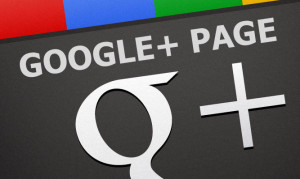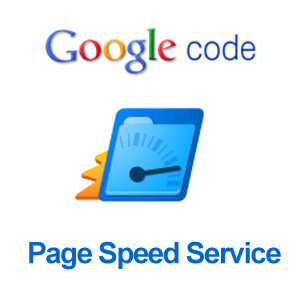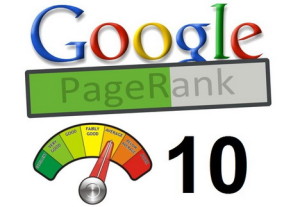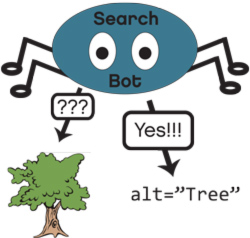
Photo by Alan Cleaver on Flickr (CC BY)
How has Google misled us? Let us count the ways!
Target audience: Marketing professionals, SEO specialists, PR pros, brand managers, businesses, nonprofits, educators, Web publishers, journalists.
 If you’ve been listening to Google of late, you’ve heard their spokespersons’ declarations that you should go merrily on your way producing content for your followers while making no attempts to improve your search rankings through explicit means. Focus on what you do best and ignore all that voodoo SEO stuff.
If you’ve been listening to Google of late, you’ve heard their spokespersons’ declarations that you should go merrily on your way producing content for your followers while making no attempts to improve your search rankings through explicit means. Focus on what you do best and ignore all that voodoo SEO stuff.
Well.
I’ll probably get some blowback for this, but it’s time to call out Google for its — how shall I put this? — sleight of hand, half-truths and tendency to lie about this.
The following list of Google mistruths have some exceptions and caveats. And, Google does make examples of bad actors, which is all to the good.
But for the vast majority of us Web publishers, bloggers and businesses who just want to create content and have it read, you should frankly ignore what Google has been telling you about backlinks not mattering anymore, SEO not mattering anymore and other misdirections.
Let’s do a rundown of which SEO elements actually still work
How has Google misled us? Let us count the ways! (I’ll list my bona fides below, and I have my own caveat: Google hasn’t said that none of the following is important, but let’s run through all of these SEO elements one by one.)
![title-tag-google-serp-example]() Good titles are still really very essential – Because Google returns search results based on the sloppy terms you enter into the search field onto a results page that pretty literally just passes your page title through, you had better do a good job of making sure every single page of your site has a very descriptive, accurate, and unique title. That’s all Google has and that’s really all you have when it comes to whether or not someone clicks on your content or not.
Good titles are still really very essential – Because Google returns search results based on the sloppy terms you enter into the search field onto a results page that pretty literally just passes your page title through, you had better do a good job of making sure every single page of your site has a very descriptive, accurate, and unique title. That’s all Google has and that’s really all you have when it comes to whether or not someone clicks on your content or not.![meta-tags]() You still need to write for robots – Google is smart. It does understand synonyms and can make leaps in logic; however, Google cares more about speed than cleverness. Luckily, there are so many people who pre-prepare everything so perfectly for Google’s thoughtless pass-through that you’ll always lose. Google doesn’t have to think at all because there are enough other sites besides your site that does everything right — such as writing for robots, literally and across a wide diversity of appropriate keyword phrases — that any laziness on your part will be harshly penalized.
You still need to write for robots – Google is smart. It does understand synonyms and can make leaps in logic; however, Google cares more about speed than cleverness. Luckily, there are so many people who pre-prepare everything so perfectly for Google’s thoughtless pass-through that you’ll always lose. Google doesn’t have to think at all because there are enough other sites besides your site that does everything right — such as writing for robots, literally and across a wide diversity of appropriate keyword phrases — that any laziness on your part will be harshly penalized.![google-page-speed-service]() Site speed is the most important – Even if you do everything right in preparing your site for a simple Google pass-through, Google will drop you as a top-three result on Organic Search if the pass-off isn’t immediate. So, after you make your site perfectly suited for Google and you’re still sucking wind, try upgrading your server, reducing the number of plugins you use, increasing the aggressiveness of your caching strategy (or, get a caching strategy), consider beefing up your server, putting our database on a separate box, get your ping down by getting closer to the the Internet‘s backbone or have someone optimize your DNS, or look into an Internet content delivery network service provider.
Site speed is the most important – Even if you do everything right in preparing your site for a simple Google pass-through, Google will drop you as a top-three result on Organic Search if the pass-off isn’t immediate. So, after you make your site perfectly suited for Google and you’re still sucking wind, try upgrading your server, reducing the number of plugins you use, increasing the aggressiveness of your caching strategy (or, get a caching strategy), consider beefing up your server, putting our database on a separate box, get your ping down by getting closer to the the Internet‘s backbone or have someone optimize your DNS, or look into an Internet content delivery network service provider.![google_pagerank10_sites]() Google is not a thinking thing or thesaurus – As a direct result of Twitter‘s success, Google rightfully feels like its results need to be real-time. In effectively creating an acceptable real time web, Google is generally in a constant feeding frenzy. A lot of cheating happens in this initial couple hours. And Google acts pretty dumb. In its rush to deliver content as it happens, real time, it tends to care more about filling the vacuum of trending breaking news than it cares about verifying. So, while Google does a good job of “trust but verify,” it trusts first. So, it’s still possible, even in 2014, to drive a lot of organic traffic to your site by just trend-surfing, news-surfing, and headline-surfing your content directly to what’s going on right now. You’ll just about always get a crush of traffic if you can be first to press on a big event, disaster, death, or announcement.
Google is not a thinking thing or thesaurus – As a direct result of Twitter‘s success, Google rightfully feels like its results need to be real-time. In effectively creating an acceptable real time web, Google is generally in a constant feeding frenzy. A lot of cheating happens in this initial couple hours. And Google acts pretty dumb. In its rush to deliver content as it happens, real time, it tends to care more about filling the vacuum of trending breaking news than it cares about verifying. So, while Google does a good job of “trust but verify,” it trusts first. So, it’s still possible, even in 2014, to drive a lot of organic traffic to your site by just trend-surfing, news-surfing, and headline-surfing your content directly to what’s going on right now. You’ll just about always get a crush of traffic if you can be first to press on a big event, disaster, death, or announcement.
-
Even in 2014, you can drive a lot of organic traffic to your site by just trend-surfing, news-surfing and headline-surfing your content directly to current events
Google is still painfully literal – If you don’t write it, literally, in a literal string, on your site, verbatim, please don’t be surprised if your site doesn’t rank at all in that particular topic.
- Conspiracies still work on Google Search — As we have learned from Cristina Everett and the New York Daily News, if you can orchestrate a lot of people to write about the same topic or link to and fro or if you can conspire to write about each other or support each other’s content back and forth or even get everyone else in your little cabal to share and mention your posts, blogs, articles, columns, products, press release, announcement, or post, conspiracies of these sorts still work on Google, especially during its super-dumb feeding frenzy real time web “yay, hot donuts” phase.
- Metatag keywords work – Everyone tells you that the META Keywords tag has been completely deprecated but I don’t buy it, especially on sites that are predominantly visual, graphical, imagistic, photographic, or based on Flash, video, Silverlight, or whatever people use because they’re not smart enough to implement HTML5.
![meta-description]() Metatag descriptions are important – This is what Google passes through directly from the pages of your site verbatim to the results in the form of the page description, second only as important as the Title. If you don’t provide a pretty, well-written, useful one, Google will lazily and hastily scrape one up for you, one that will probably suck and might even eventually result in Google deprioritizing your site (because there’s always someone else who will gladly do it right).
Metatag descriptions are important – This is what Google passes through directly from the pages of your site verbatim to the results in the form of the page description, second only as important as the Title. If you don’t provide a pretty, well-written, useful one, Google will lazily and hastily scrape one up for you, one that will probably suck and might even eventually result in Google deprioritizing your site (because there’s always someone else who will gladly do it right).![search-bot-alt-text]() Alt tags are essential – Google still really can’t do anything with video or images or photos or code blobs unless you describe them or label them textually in a way that Google can read and index. And, if you do a good job of labeling your images, graphics, logos, executables, scripts, documents and PDFs, Google will reward you by showing your photos and videos and images and logos and graphics when people do image or video searches or even inline in regular web searches. If you dominate image and video search in your vertical, it can really help your general ranking everywhere else. So, it’s not even just the ALT tag anymore, there are quite a few ways to use HTML Schema to tell Google what’s going on. Do it! Drupal, Joomla, WordPress, and even Squarespace make it super-easy so you really have no damn excuse! Do it! Do it!
Alt tags are essential – Google still really can’t do anything with video or images or photos or code blobs unless you describe them or label them textually in a way that Google can read and index. And, if you do a good job of labeling your images, graphics, logos, executables, scripts, documents and PDFs, Google will reward you by showing your photos and videos and images and logos and graphics when people do image or video searches or even inline in regular web searches. If you dominate image and video search in your vertical, it can really help your general ranking everywhere else. So, it’s not even just the ALT tag anymore, there are quite a few ways to use HTML Schema to tell Google what’s going on. Do it! Drupal, Joomla, WordPress, and even Squarespace make it super-easy so you really have no damn excuse! Do it! Do it!- Name all your files to be Google-readable — I spoke on this in the previous bullet but instead of leaving your photos and images with their default file names, be it what Adobe named them during some sort of slicing process or whatever your digital camera or phone named it when you uploaded it to your server. Instead of Photo.jpg, name your photo chris-abraham-portrait-black-glasses-black-t-shirt-socialmediabiz.jpg or something like that.
![Quality-Backlinks]() Backlinks (still) matter – Reciprocal links, Page Rank, Domain Name age, and Backlinks are the core of Google and they’ll never really get rid of it. It’s their secret sauce and whether they’ve developed a new formulation there is still some sort of Google Rank or Google Klout going on — this Very Big Lie that backlinks no longer matter is the source of this article, Google is a lying liar that lies, as that’s one hell of a Big Lie.
Backlinks (still) matter – Reciprocal links, Page Rank, Domain Name age, and Backlinks are the core of Google and they’ll never really get rid of it. It’s their secret sauce and whether they’ve developed a new formulation there is still some sort of Google Rank or Google Klout going on — this Very Big Lie that backlinks no longer matter is the source of this article, Google is a lying liar that lies, as that’s one hell of a Big Lie.- Human readable URLs are important – If your content management system (CMS) still gives you URLs that look like www.socialmedia.biz/?p=27642 instead of www.socialmedia.biz/2014/08/20/always-write-for-google-never-for-humans, then you really need to either install a plugin or upgrade your crappy CMS.
- Google still cares about formatting tags — No matter what anyone says, use the <h1>, <h2>, <h3>, <em>, <i>, <b>, <u>, and their HTML5 and CSS equivalents — they add structure and Google hearts structure.
- Google still indexes every page “separately” – You need to make sure every single one of the pages on your site are optimized. Google indexes by page and not by site. You need to have a separate title, keywords, description, and copy for every page and not just for the site. You need to either do it perfectly for each page or choose an SEO plugin that can do it for you automagically.
![GoogleAuthor2]() Google hasn’t given up on Authorship – Even though 70% of all publishers, platforms, sites, papers, bloggers and writers ignored Google Authorship, Google rewards everyone who works happily and merrily toward making Google happy, and they’ll surely find a way to not deprecate the hard work we put into their effing terrible, unpopular, and alienating Google+, Google+ Pages, and Google Authorship.
Google hasn’t given up on Authorship – Even though 70% of all publishers, platforms, sites, papers, bloggers and writers ignored Google Authorship, Google rewards everyone who works happily and merrily toward making Google happy, and they’ll surely find a way to not deprecate the hard work we put into their effing terrible, unpopular, and alienating Google+, Google+ Pages, and Google Authorship.- Google kisses Google+ users’ bottoms — Go invest the rest of this week mastering Google+, Google Plus Pages, Google+ Business Pages, and Google+ Communities. Do it!
- Google cares very much about site architecture – All robots and bots would always prefer structure data to the muddy hell known as whatever we like to read, research, and explore as humans. So, any predictable structure you can design into your site will be surely appreciated by the robots and bots of Google. If you move your site to a popular publishing platform like WordPress or Drupal, you will have invested in a structured platform that Google gets already.
![rss_xml_atom_feeds_news_icon]()
- Google still does care about Sitemaps – Google loves structured data and Google loves it when you let it know that your site’s been updated instead of just waiting around until a Spider or Bot comes around.
- Google still loves RSS and ATOM – Google loves structured data, remember?
- Google actually prefers long-form content — Google indexes about half a megabyte, 520 Kb, per page, so you’re doing yourself a disservice by keeping your pages limited to 100 Kb. And, Bing probably indexes upwards of a megabyte of each page. Each page, that’s right, and not your entire site.
My bona fides, or, do I know what I’m talking about?
 I’ve been producing websites since 1993, submitting sites to directories well before search engines sent out bots and spiders, and tailoring content for Google since late 1998. Soon to be 16 years later, Google hasn’t left behind all of its old tricks — no matter what Google tries to tell you what Google organic search has become circa 2014. When it comes to how things work when it comes to developing a server, site, content, and brand to appeal to Google, Google is a lying liar that lies.
I’ve been producing websites since 1993, submitting sites to directories well before search engines sent out bots and spiders, and tailoring content for Google since late 1998. Soon to be 16 years later, Google hasn’t left behind all of its old tricks — no matter what Google tries to tell you what Google organic search has become circa 2014. When it comes to how things work when it comes to developing a server, site, content, and brand to appeal to Google, Google is a lying liar that lies.
Google can’t afford to leave anyone behind
Every time Google has tried to raise us up and improve us as Internet publishers, they have failed; and, they can’t afford to leave our content or us behind, especially when they so desperately want the entire world to build a mirror copy of In Real Life online and in a form that Google can index and understand. As a result, they need to do the equivalent of making the search algorithm as patient, accepting, compliant, flexible, and empowering as humanely possible, otherwise, the only sites that will every return are sites that are heavily bankrolled. Google might very well be lying to us, but it really does care about the best customer service experience humanly possible. And, in service of that, Google has and will continue to turn the other cheek while at the same time telling us exactly the opposite.
And, if you want to read a lot more about this subject, I wrote a much longer-form version over on the Biznology blog.
 Good titles are still really very essential – Because Google returns search results based on the sloppy terms you enter into the search field onto a results page that pretty literally just passes your page title through, you had better do a good job of making sure every single page of your site has a very descriptive, accurate, and unique title. That’s all Google has and that’s really all you have when it comes to whether or not someone clicks on your content or not.
Good titles are still really very essential – Because Google returns search results based on the sloppy terms you enter into the search field onto a results page that pretty literally just passes your page title through, you had better do a good job of making sure every single page of your site has a very descriptive, accurate, and unique title. That’s all Google has and that’s really all you have when it comes to whether or not someone clicks on your content or not. You still need to write for robots – Google is smart. It does understand synonyms and can make leaps in logic; however, Google cares more about speed than cleverness. Luckily, there are so many people who pre-prepare everything so perfectly for Google’s thoughtless pass-through that you’ll always lose. Google doesn’t have to think at all because there are enough other sites besides your site that does everything right — such as writing for robots, literally and across a wide diversity of appropriate keyword phrases — that any laziness on your part will be harshly penalized.
You still need to write for robots – Google is smart. It does understand synonyms and can make leaps in logic; however, Google cares more about speed than cleverness. Luckily, there are so many people who pre-prepare everything so perfectly for Google’s thoughtless pass-through that you’ll always lose. Google doesn’t have to think at all because there are enough other sites besides your site that does everything right — such as writing for robots, literally and across a wide diversity of appropriate keyword phrases — that any laziness on your part will be harshly penalized.
 Google is not a thinking thing or thesaurus – As a direct result of
Google is not a thinking thing or thesaurus – As a direct result of  Metatag descriptions are important – This is what Google passes through directly from the pages of your site verbatim to the results in the form of the page description, second only as important as the
Metatag descriptions are important – This is what Google passes through directly from the pages of your site verbatim to the results in the form of the page description, second only as important as the  Alt tags are essential – Google still really can’t do anything with video or images or photos or code blobs unless you describe them or label them textually in a way that Google can read and index. And, if you do a good job of labeling your images, graphics, logos, executables, scripts, documents and
Alt tags are essential – Google still really can’t do anything with video or images or photos or code blobs unless you describe them or label them textually in a way that Google can read and index. And, if you do a good job of labeling your images, graphics, logos, executables, scripts, documents and  Backlinks (still) matter –
Backlinks (still) matter –  Google hasn’t given up on Authorship – Even though 70% of all publishers, platforms, sites, papers, bloggers and writers ignored Google Authorship, Google rewards everyone who works happily and merrily toward making Google happy, and they’ll surely find a way to not deprecate the hard work we put into their effing terrible, unpopular, and alienating Google+, Google+ Pages, and Google Authorship.
Google hasn’t given up on Authorship – Even though 70% of all publishers, platforms, sites, papers, bloggers and writers ignored Google Authorship, Google rewards everyone who works happily and merrily toward making Google happy, and they’ll surely find a way to not deprecate the hard work we put into their effing terrible, unpopular, and alienating Google+, Google+ Pages, and Google Authorship.

















